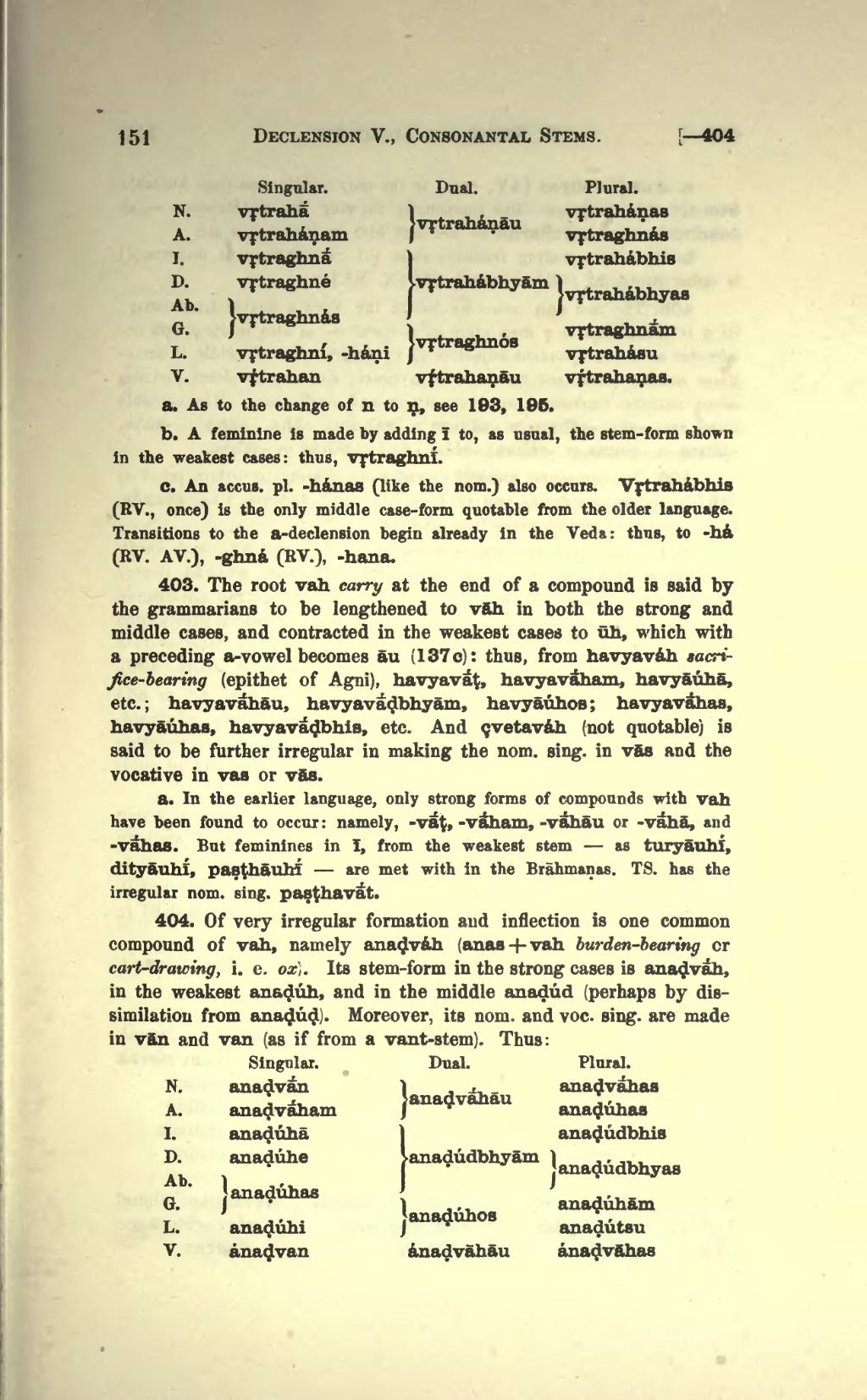| Singular. | Dual. | Plural. | |
|---|---|---|---|
| N. | vṛtrahā́ | vṛtraháṇāu | vṛtraháṇas |
| A. | vṛtraháṇam | vṛtraghnás | |
| I. | vṛtraghnā́ | vṛtrahábhyām | vṛtrahábhis |
| D. | vṛtraghné | vṛtrahábhyas | |
| Ab. | vṛtraghnás | ||
| G. | vṛtraghnós | vṛtraghnā́m | |
| L. | vṛtraghní, -háṇi | vṛtrahásu | |
| V. | vṛ́trahan | vṛ́trahaṇāu | vṛ́trahaṇas |
a. As to the change of n to ṇ, see 193, 195.
b. A feminine is made by adding ī to, as usual, the stem-form shown in the weakest cases: thus, vṛtraghnī́.
c. An accus. pl. -hánas (like the nom.) also occurs. Vṛtrahábhis (RV., once) is the only middle case-form quotable from the older language. Transitions to the a-declension begin already in the Veda: thus, to -há (RV. AV.), -ghná (RV.), -hana.
403. The root vah carry at the end of a compound is said by the grammarians to be lengthened to vāh in both the strong and middle cases, and contracted in the weakest cases to ūh, which with a preceding a-vowel becomes āu (137 c): thus, from havyaváh sacrifice-bearing (epithet of Agni), havyavā́ṭ, havyavā́ham, havyāúhā, etc.; havyavā́hāu, havyavā́ḍbhyām, havyāúhos; havyavā́has, havyāúhas, havyavā́ḍbhis, etc. And çvetaváh (not quotable) is said to be further irregular in making the nom. sing. in vās and the vocative in vas or vās.
a. In the earlier language, only strong forms of compounds with vah have been found to occur: namely, -vā́ṭ, -vā́ham, -vā́hāu or -vā́hā, and -vā́has. But feminines in ī, from the weakest stem — as turyāuhī́, dityāuhī́, paṣṭhāuhī́ — are met with in the Brāhmaṇas. TS. has the irregular nom. sing. paṣṭhavā́t.
404. Of very irregular formation and inflection is one common compound of vah, namely anaḍváh (anas+vah, burden-bearing or cart-drawing, i.e. ox). Its stem-form in the strong cases is anaḍvā́h, in the weakest anaḍúh, and in the middle anaḍúd (perhaps by dissimilation from anaḍúḍ). Moreover, its nom. and voc. sing, are made in vān and van (as if from a vant-stem). Thus:
| Singular. | Dual. | Plural. | |
|---|---|---|---|
| N. | anaḍvā́n | anaḍvā́hāu | anaḍvā́has |
| A. | anaḍvā́ham | anaḍúhas | |
| I. | anaḍúhā | anaḍúdbhyām | anaḍúdbhis |
| D. | anaḍúhe | anaḍúdbhyas | |
| Ab. | anaḍúhas | ||
| G. | anaḍúhos | anaḍúhām | |
| L. | anaḍúhi | anaḍútsu | |
| V. | ánaḍvan | ánaḍvāhāu | ánaḍvāhas |
